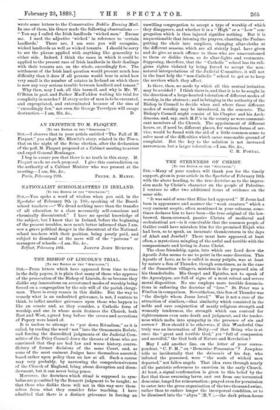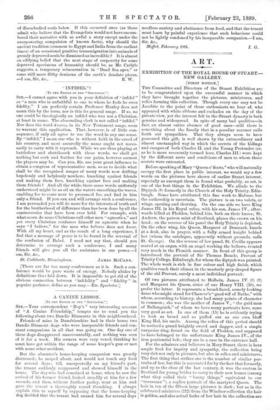THE STERNNESS OF CHRIST.
[To THE EDITOR OF THE "SPECTATOR."] SIR,—Many of your readers will thank you for the timely support, given in your article in the Spectator of February 16th with the above heading, to the true doctrine as to the impres- sion made by Christ's character on the people of Palestine. I venture to offer two additional items of evidence on the same side.
" It was said of some that Elias had appeared." If Jesus had been in appearance and manner the " weak creature " which a very eminent sceptic, often mentioned in your columns, some- times declares him to have been—the true original of the low- browed, thorn-crowned, passive Christa of mediaeval and ecclesiastical art—is it conceivable that the common people of Galilee could have mistaken him for the promised Elijah who had been, so to speak, an incarnate thunderstorm in the days of Ahab and Jezebel? There must have appeared, at least often, a mysterious mingling of the awful and terrible with the compassionate and loving in Jesus Christ.
The close friendship, again, into which our Lord drew the Apostle John seems to me to point in the same direction. This Apostle of Love, as he is called in many pulpits, was at least by nature a Son of Thunder, though sometimes, as in the case of the Samaritan villagers, mistaken in the proposed aim of his thunderbolts. His Gospel and Epistles, not to speak of the Apocalypse, are full of signs of a most robust and severe moral disposition. No one employs more terrible denuncia- tions in enforcing the doctrine of "love." St. Peter was a Fenelon in comparison. Nevertheless, this Son of Thunder was " the disciple whom Jesus loved." Was it not a case of the attraction of similars,—that similarity which consisted in the noble and rare conjunction of manly religious strength and womanly tenderness, the strength which can contend for righteousness even unto death and judgment, and the tender- ness which melts into sympathy in the presence of sin and sorrow ? How should it be otherwise, if this Wonderful One truly was an incarnation of Deity,—of that Being who is at once the " great and terrible God," yet " full of compassion and merciful," the God both of Nature and Revelation ?
May I add another line, on the letter of your corres- pondent, " C. P. M.," on "Demoniac Possession " Josephus tells us incidentally that the dairnonia of his day, who infested the possessed, were " the souls of wicked men departed," not fallen angels. That idea runs through nearly all the patristic references to exorcism in the early Church. At least, a signal confirmation is given to this belief by the fact that those swarming larvae, cast out from one tormented demoniac, longed for reincarnation ; prayed even for permission to enter into the gross organisation of the two thousand swine, rather than to endure longer the incorporeal condition, or to be dismissed into the " abyss " (R.V.),—the dark prison-house of disembodied souls below. If this occurred once (as those admit who believe that the Evangelists would not have encum- bered their narrative with so awful a story except under the overpowering compulsion of known facts), why should the ancient tradition (common to Egypt and India from the earliest times) of an occasional punitive transmigration into animals of grossly depraved souls be dismissed as incredible P It is almost an edifying belief that the next stage of corporeity for some depraved specimens of humanity should be, as Mr. Carlyle suggests, a temporary reincarnation in " Dead Sea apes," or some still more filthy denizens of the earth's desolate places.



































 Previous page
Previous page